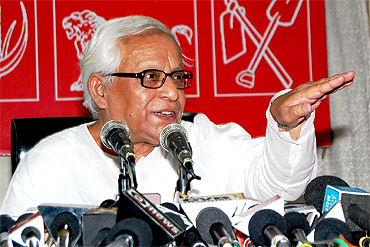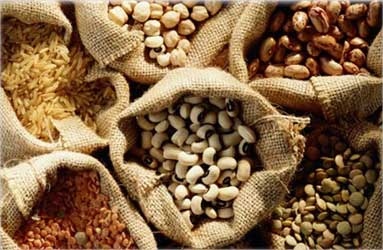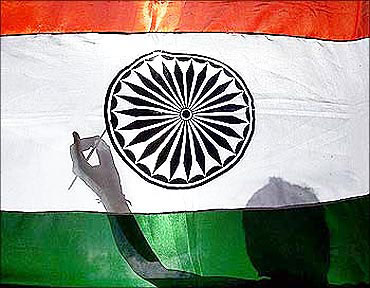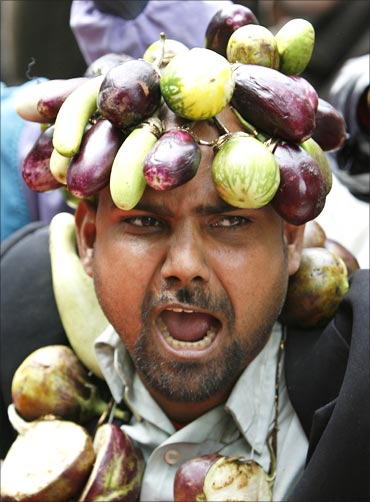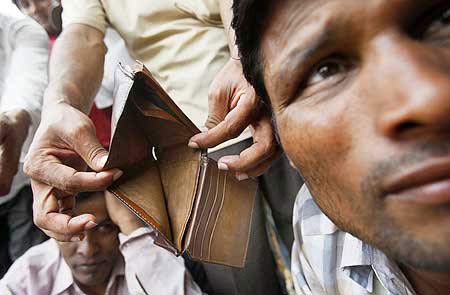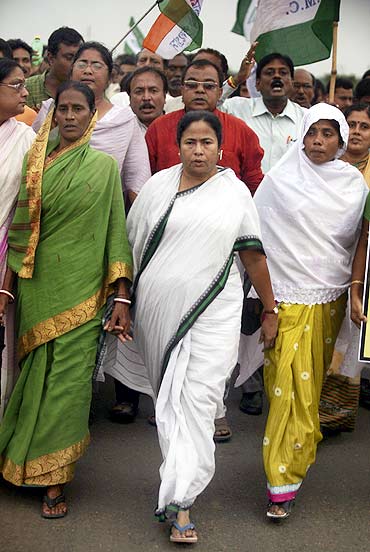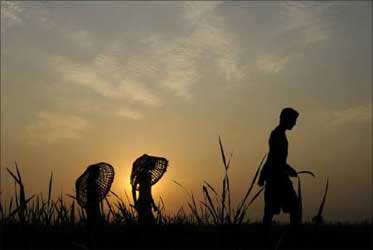 | « Back to article | Print this article |
How Buddha plans to improve Bengal's economy
Inflation is the biggest concern for India today, said Buddhadev Bhattacharjee at a press conference in Kolkata on Wednesday.
Amid talks of a probable change in governance in West Bengal, the chief minister stated categorically, "We are not starting from scratch."
He stressed on increasing agricultural productivity, better functioning of the public distribution system and infusing more subsidy into the system.
The West Bengal chief minister dished out a prescription to improve the economic condition of the state.
Click NEXT to read what he has to say. . .
How Buddha plans to improve Bengal's economy
What caused inflation
"Decreased agricultural production is one of the main causes for inflation. Another grave issue is that of interference of middlemen. The latter not only exploit the cultivators but also manipulate the market to hike the prices unnaturally," said the West Bengal chief minister.
"Economists attribute inflation to a demand-pull theory. According to this, if there is a huge demand for products in all sectors, it results in a shortage of goods. Thus prices of commodities shoot up," he said.
"Another reason for inflation is the cost-push theory. It says that labour groups also trigger inflation. When wages for labourers are increased, producers raise the prices of products to make up for salary hike," he said..
"The rising prices of food products, manufacturing products, and essential commodities have pushed inflation rate further in India," he added.
Click NEXT to read further. . .
How Buddha plans to improve Bengal's economy
States' appeal to the Centre
The West Bengal chief minister stated that he has appealed to the Centre repeatedly to do something to curb inflation but each time the response has been that the Centre cannot do everything, the states too need to take some responsibility.
The chief minister is of the opinion that if the central government can tackle corruption and can bring back black money stashed away abroad, those funds can be utlised to overhaul the public distribution system.
"Rs 174,000-crore (Rs 1.740 trillion) that got washed away because of the 2G scam could have alone breathed fresh life into the public distribution system," Buddhadev Bhattacharjee said.
"Similarly, black money, when brought back, can add a substatantial amount to the central funds," he added.
Click NEXT to read further. . .
How Buddha plans to improve Bengal's economy
Food security: how can it be achieved
The West Bengal chief minister said that it was possible for the Left Front government to distribute 18 metric tonens of foodgrain through the public distribution system.
"Schemes are afoot to provide families with monthly income of less than Rs 10,000 with rice at Rs 2 per kg. The state government will soon start distributing pulses, sugar, edible oils, too, through ration shops," the chief minister said,
Click NEXT to read further. . .
How Buddha plans to improve Bengal's economy
Generating employment a key tool
"Sadly, as it has happened during Congress regimes in the past, we are seeing the emergence of two Indias -- one for the rich and another for the poor," said the West Bengal chief minister.
"The gap between the rich and the poor seems to be widening and the government is doing nothing.
"While 3 out of 10 richest people in the world happen to be Indians, millions go to bed hungry. One way of countering this would be by generating employment," said Bhattacharjee.
Click NEXT to read on . . .
How Buddha plans to improve Bengal's economy
Encouraging industrialisation
"Ours is the only state (West Bengal) where 84 per cent of the land belongs to the farmers. Naturally, therefore, agriculture is always in focus," said Bhattacharjee.
"Yet, we should not neglect industrialization. For, no economy can improve without industries," he said.
Speaking about the Singur incident, the West Bengal chief minister said that the Tatas had to return because of 'some irresponsible opposition' put forth by the Trinamool Congress.
"We too made some mistakes there as far as land acquisition is concerned. But we have learnt from the Singur incident and have decided to move on," he said.
The chief minister negated his detractors' claims that industrialisation has taken a back seat in the state.
"In 2010, West Bengal received Rs 15,000 crore (Rs 150 billion) as investment in industries. The figures are quite encouraging," he added.
Click NEXT to read further. . .
How Buddha plans to improve Bengal's economy
An improved land reforms policy
The chief minister said the Left Front has started mapping the land of the state to improve the land acquisition policy and to set up a land bank.
"Taking a lesson from the Singur incident, we have decided to start negotiations with the owners from the beginning and to acquire land only on consent," Buddhadev Bhattacharjee said.
So far, the state has been able to acquire 8,100 acres of land following this method.
"In certain cases, we will ask those willing to set up factories in the state to make the deals with the landowners themselves."
Click NEXT to read further. . .
How Buddha plans to improve Bengal's economy
Welfare schemes for marginalised labour
"No state can flourish unless its marginalised population is taken care of. We have decided to launch provident funds for unorganised labour and self help groups," said the West Bengal chief minister.
"We have so far reached 25 lakh (2.5 million) labourers and 18 lakh (1.8 million) women belonging to the self-help groups," he said.
There are also plans to start special health schemes for the marginalised and below poverty line people in near future, he said.
The chief minister also intends to include the Scheduled Castes, Scheduled Tribes and Other Backward Classes in these schemes.
